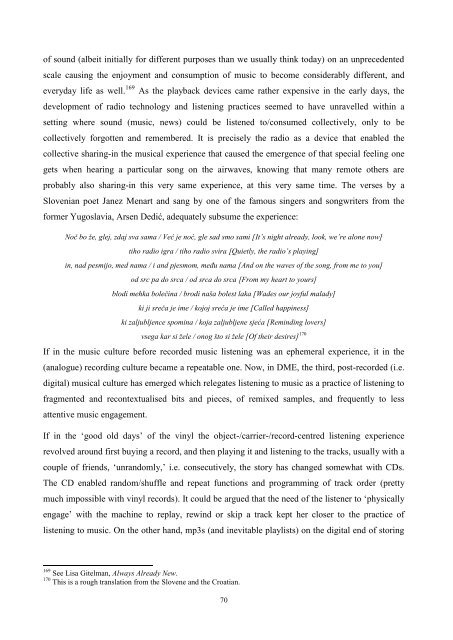UNIVERSITY OF NOVA GORICA GRADUATE SCHOOL ...
UNIVERSITY OF NOVA GORICA GRADUATE SCHOOL ...
UNIVERSITY OF NOVA GORICA GRADUATE SCHOOL ...
Create successful ePaper yourself
Turn your PDF publications into a flip-book with our unique Google optimized e-Paper software.
of sound (albeit initially for different purposes than we usually think today) on an unprecedented<br />
scale causing the enjoyment and consumption of music to become considerably different, and<br />
everyday life as well. 169 As the playback devices came rather expensive in the early days, the<br />
development of radio technology and listening practices seemed to have unravelled within a<br />
setting where sound (music, news) could be listened to/consumed collectively, only to be<br />
collectively forgotten and remembered. It is precisely the radio as a device that enabled the<br />
collective sharing-in the musical experience that caused the emergence of that special feeling one<br />
gets when hearing a particular song on the airwaves, knowing that many remote others are<br />
probably also sharing-in this very same experience, at this very same time. The verses by a<br />
Slovenian poet Janez Menart and sang by one of the famous singers and songwriters from the<br />
former Yugoslavia, Arsen Dedić, adequately subsume the experience:<br />
Noč bo že, glej, zdaj sva sama / Već je noć, gle sad smo sami [It‘s night already, look, we‘re alone now]<br />
tiho radio igra / tiho radio svira [Quietly, the radio‘s playing]<br />
in, nad pesmijo, med nama / i and pjesmom, meĎu nama [And on the waves of the song, from me to you]<br />
od src pa do srca / od srca do srca [From my heart to yours]<br />
blodi mehka bolečina / brodi naša bolest laka [Wades our joyful malady]<br />
ki ji sreča je ime / kojoj sreća je ime [Called happiness]<br />
ki zaljubljence spomina / koja zaljubljene sjeća [Reminding lovers]<br />
vsega kar si žele / onog što si žele [Of their desires] 170<br />
If in the music culture before recorded music listening was an ephemeral experience, it in the<br />
(analogue) recording culture became a repeatable one. Now, in DME, the third, post-recorded (i.e.<br />
digital) musical culture has emerged which relegates listening to music as a practice of listening to<br />
fragmented and recontextualised bits and pieces, of remixed samples, and frequently to less<br />
attentive music engagement.<br />
If in the ‗good old days‘ of the vinyl the object-/carrier-/record-centred listening experience<br />
revolved around first buying a record, and then playing it and listening to the tracks, usually with a<br />
couple of friends, ‗unrandomly,‘ i.e. consecutively, the story has changed somewhat with CDs.<br />
The CD enabled random/shuffle and repeat functions and programming of track order (pretty<br />
much impossible with vinyl records). It could be argued that the need of the listener to ‗physically<br />
engage‘ with the machine to replay, rewind or skip a track kept her closer to the practice of<br />
listening to music. On the other hand, mp3s (and inevitable playlists) on the digital end of storing<br />
169 See Lisa Gitelman, Always Already New.<br />
170 This is a rough translation from the Slovene and the Croatian.<br />
70

















